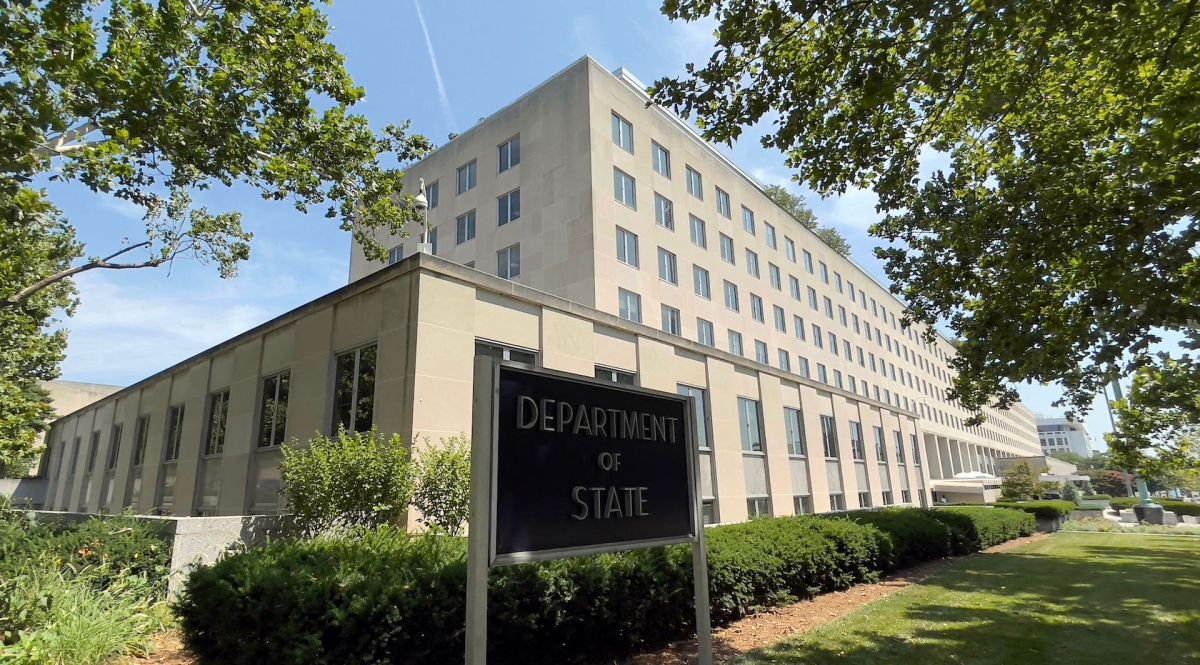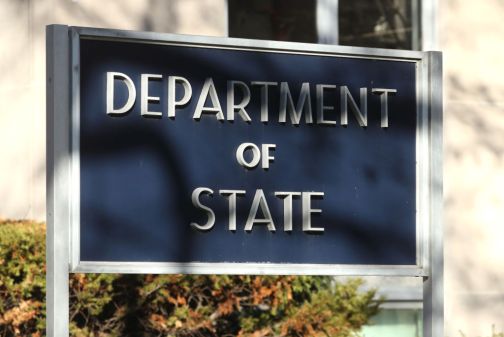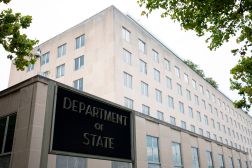Can the Global Engagement Center make the case for itself?

As the Trump administration prepares to take office and Republicans get set to assume majority control of the House and Senate, a small-but-controversial federal office focused on disinformation campaigns abroad is fighting for its life.
Funding for the State Department’s Global Engagement Center is set to terminate at the end of the year, and Republican critics in Congress unhappy with the center’s work under the Biden administration have signaled they may allow authorization to lapse. That has GEC officials — who argue that AI has made their work more important — fighting to justify its continued existence.
Conversations with State Department officials and documents obtained by Scoop News Group through a Freedom of Information Act request reveal a body that is attempting to track disinformation across a daunting geographic and threat landscape, while operating with limited budget and technological resources.
“It is critical that government have this capability to combat foreign information manipulation overseas,” Carrie Goux, the GEC’s acting deputy coordinator, said in an interview with Scoop. “Nefarious and covert networks of information manipulation” from Iranian, Chinese and Russian actors must be “exposed and disrupted” so “that we can work with our international partners to protect our national security overseas.”
Supporters say the GEC fulfills an important role in State Department operations and U.S. diplomacy.
“The Global Engagement Center goes out and finds false stories about the United States or incorrect stories about Russia or China and corrects the record nationally,” said Mark Montgomery, former executive director of the Cyberspace Solarium Commission and policy director for the Senate Armed Services Committee. “We need someone out there doing that [and] that needs to be the State Department, not the Intelligence Community, not the Defense Department. … It is a wholly State Department responsibility.”
Launched in 2016, the GEC aims to be a technology-forward entity within the State Department, focused on using social media data and machine learning to understand foreign disinformation campaigns directed at audiences outside of the United States.
Officials and allies hope the GEC’s international mission will distinguish its work from other public- or private-sector disinformation efforts that focus on the impact to domestic U.S. politics — and shield the office from criticisms from some Republican policymakers and conservative influencers, including X CEO Elon Musk.
A data-driven approach
The Global Engagement Center has positioned itself as a “data-driven body” that uses digital analytics to understand narratives that might be promulgated by foreign actors abroad, while helping to bring technology for understanding this kind of discourse into government.
A spokesperson for the State Department told Scoop that GEC’s work includes tracking the growth of narratives and “pre-bunking” disinformation, or highlighting false claims and propaganda networks before they can gain significant reach online. The center operates with a staff of around 120 and a base budget of $61 million.
Some of GEC’s work has involved the use of some forms of artificial intelligence, though not the large language models like those produced by Anthropic and OpenAI. The State Department’s AI inventory shows that the GEC is using several forms of AI, including a sentiment model, a topic model, and text similarity technology. Those use cases appear to be in line with the kinds of tools used by academics and the private sector.
Documents obtained through a public records request lend insight into the last use. They include a study related to disinformation-associated outlets in the Czech Republic and another analysis of attribution of PRC state media articles on Xinjiang published outside of China. They also included an evaluation of content spread by accounts associated with the far-right German party AfD, as well as content that distorted or denied the Holocaust.
But the documents and conversations with State Department officials reveal a limited scope and desire to work on and build cutting-edge technology that they say could help combat new forms of disinformation. The organization is only so big, and can only process and analyze so much data.
The GEC’s text similarity approach aims to study how the same or similar text might be populated across social media, which could hint at a coordinated narrative. That methodology allows human analysts to narrow in on a much smaller set of data, while improvements to the technology enable it to take into account the timeframe of posts as well. The GEC has also moved beyond looking mostly at Twitter to other platforms, with some work taking advantage of open-source tools and custom Python scripts built in-house.
Notably, text similarity is just one of the tools the center is using. And while text-based content remains the most popular form of online disinformation, the center is interested in technologies that provide similar analysis of audio, video and imagery. Intelligence agencies and tech companies have warned that these forms of disinformation are increasingly being used by Russia, China, Iran and other adversarial countries in information operations.
If the GEC’s lifespan is extended, Goux said technology would continue to play a major role in its operations.
Politicians divided on GEC’s future
While the Supreme Court ruled that information-sharing between government agencies and social media companies on content moderation during the Biden administration did not expressly violate the First Amendment, many of the agencies and outside organizations involved in those efforts have run afoul of congressional Republicans and critics, who say it represents an attack on Americans’ First Amendment rights.
Despite its foreign-focused mission, the GEC is one of the organizations that has come under fire from Republicans on the Hill. In July, House Foreign Affairs Committee Chair Michael McCaul, R-Texas, and subcommittee chairs Brian Mast, R-Fla., and Darrell Issa, R-Calif., wrote to Secretary of State Antony Blinken warning that they had serious reservations about reauthorizing the GEC and that the center is “facing growing scrutiny here in Washington and across the country.”
They cited ongoing lawsuits that accused the GEC of “directly, and indirectly through an organization called the Election Integrity Partnership (EIP), communicat[ing] with social media companies to identify American-origin posts as mis- or disinformation and effect their takedown, many during the 2020 election cycle.”
Beyond that, the members questioned whether the GEC has “demonstrated its future existence is vital to the U.S. diplomatic mission, especially at a time when the impact of its controversial grant funding seems unclear and perhaps negligible, its reports mirror what think tanks have said for years, and foreign disinformation is already the topic of intelligence reporting.”
Some supporters of the center expressed sympathy with that view. Montgomery, now a senior director and fellow at the Foundation for Defense of Democracies, a hawkish think tank based in Washington D.C., said the GEC “made a mistake a few years ago with who they did business with.”
“If I were Secretary Blinken … I’d be the bigger man right now, go out there, say we made a mistake and move on,” Montgomery said. “They won’t do that, the House Republicans won’t let go of it, and if we end up letting the GEC [expire] we are going to hurt the United States.
A State Department spokesperson told Scoop News Group that the GEC’s mission is to recognize, understand, expose, and counter foreign disinformation and propaganda overseas.
“We actively take measures to exclude U.S. person data from our searches,” the spokesperson said.
Like many entities that attempt to track and defuse disinformation, the GEC has also found it difficult at times to quantify the impact of their work to skeptics.
Goux told Scoop News Group that measuring the impact of the GEC’s work can be challenging, since it’s difficult to connect what goes on online to a political outcome.
When asked for examples of the center’s impact, GEC officials pointed to recent elections in Moldova, where the State Department sought to defang propaganda campaigns from Russia. Outside observers have said the Kremlin has spent tens of millions of dollars in disinformation campaigns, deepfakes, and hack-and-leak operations designed to influence the country’s presidential race and a referendum endorsing Moldovan entry in the European Union.
Both the pro-Western candidate and the EU referendum won, and Moldova has formally accused Moscow of interfering in its elections, causing President Joe Biden to remark that “Russia failed” in its attempts to undermine the democratic process.
But in Georgia, another eastern European country facing upcoming elections and interference efforts from Russia, the opposite occurred. The ruling pro-Kremlin Dream party retained power amid allegations of vote rigging by the opposition party and international observers, and Georgian President Salome Zourabichvili has referred to the election as a “Russian special operation.”
Goux told Scoop News Group that the GEC wasn’t “equally involved” in exposing covert Russian influence efforts in Georgia’s elections and “can’t speak to” the outcome. Asked why the GEC would focus on Moldova’s elections but not Georgia despite similar U.S. interests and Russian interference, she said the center works with international partners where it can and “we are working with the resources that we currently have.”
Those are the kind of questions State Department officials are likely to encounter on the Hill as the agency fights for its continued existence.
Montgomery said sunsetting the center would represent a major setback to U.S. efforts to fight disinformation campaigns abroad.
“If we lose this,” he said, “it’ll take years to recover this capability and capacity in our State Department, and that’s two or three years of the Russians and the Chinese and the Iranians running wild with their bullshit.”






